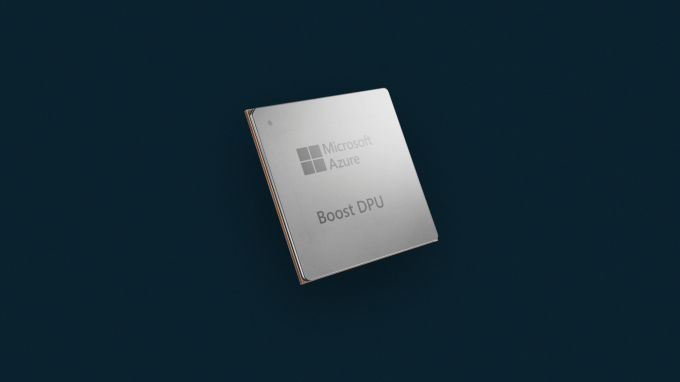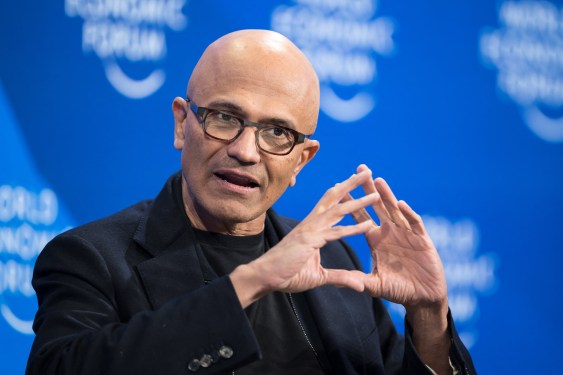Microsoft on Tuesday revealed new custom chips aimed at powering workloads on its Azure cloud and bolstering security, particularly a new hardware accelerator that can manage data processing, networking, and storage-related tasks.
The Azure Boost DPU is Microsoft’s first data processing unit, designed for “data-centric workloads with high efficiency and low power,” the company said. Microsoft expects future DPU-equipped Azure servers to run storage workloads at four times the performance of existing servers while consuming three times less power.
“Designed for scale-out, composable workloads on Azure, the Azure Boost DPU delivers efficiency across storage, networking, acceleration, and more for its cloud infrastructure,” Microsoft wrote in a blog post shared with TechCrunch.
Of course, those benchmarks don’t tell us much. On which workloads is the Azure Boost DPU more power efficient, and compared to which existing hardware is it faster, exactly? Microsoft didn’t say, nor did it mention when Azure customers can expect to see these gains.
The Azure Boost DPU likely has its origins in Fungible, a DPU fabricator that Microsoft acquired last December. Microsoft reportedly paid around $190 million for the company, which was founded by former Apple and Juniper Networks engineers. The Fungible team joined Microsoft’s infrastructure engineering division following the acquisition.

A DPU is a dedicated piece of hardware designed to handle certain data processing tasks that may include security and network routing for data traffic. They are intended to help reduce the load on CPUs and other chips for core computing tasks related to a given workload, including AI workloads.
The DPU market has come into prominence over the past few years. Nvidia began offering its BlueField line of DPUs in 2019, while AMD has been selling its Pensando DPUs since 2022. Amazon Web Services’ (AWS) Nitro cards provide DPU-like functionality, and Google has worked with Intel to build chips that perform many of the same functions as DPUs.
The efficiency gains DPUs could deliver are attractive to hyperscalers, which, driven by the demand for AI to expand their cloud infrastructure, are building ever larger and more power-hungry data centers. Microsoft said in 2022 that it would pay $800 million more in data center energy costs as a result of its growing consumption.
Nvidia CEO Jensen Huang has argued that CPUs, GPUs, and DPUs will form the foundation of data centers. Under his vision, CPUs will handle general processing, GPUs will power accelerated computing, and DPUs will manage data flow.
Should the interest in DPUs remain steady, the market for DPU chips could be worth $5.5 billion by 2031.
Custom security chip
Microsoft also revealed the Azure Integrated Hardware Security Module (HSM). A new in-house cloud security chip, the Azure Integrated HSM lets signing keys (digital cryptographic signatures, basically) and encryption keys (strings of bits used to encrypt data) be contained in a secure module “without compromising performance or increasing latency,” Microsoft said.
“Azure Integrated HSM will be installed in every new server in Microsoft’s data centers starting next year to increase protection across Azure’s hardware fleet for both confidential and general-purpose workloads,” Microsoft said.
The Azure Integrated HSM is Microsoft’s second security chip after Pluton, a consumer-focused chip built into Intel, AMD, and Qualcomm processors. It’s also the company’s answer to its cloud rivals’ proprietary solutions: AWS’ Nitro handles certain security tasks, while Google has a security chip built into Google Cloud servers called Titan.

Custom silicon can improve security, but it isn’t a panacea. In 2020, researchers found an “unfixable” flaw in Apple’s T2 security chip that could open Macs up to the very threats the chip was designed to prevent. Microsoft didn’t provide details about vulnerability testing on the Azure Integrated HSM, but it hopefully will as the chip nears launch.
Following high-profile hacks and damning government reports, Microsoft CEO Satya Nadella has claimed that security is now the company’s top priority.
“In today’s rapidly changing threat landscape, influenced by global events and AI advancements, security must be top of mind,” Vasu Jakkal, Microsoft’s CVP of security, wrote in a post shared with TechCrunch. “New attack methods challenge our security posture, pushing us to reimagine how the global security community defends organizations.”






